Another year has come and gone. You know what that means, don't you? Time for a bunch of strangers to tell you what was good! And why should you care what the LitReactor staff thinks are the best books of the year? Trick question! You shouldn't. But what they have to say might interest you nonetheless, because they are good-looking and knowledgeable and they read like the wind. So for those who care, we submit for your approval/derision some of LitReactor's favorite reads of 2018 (part III). [Read part I, part II]
Not all of these books were published this year. We figured if someone read a book for the first time in 2018, they deserved the opportunity to crow about it.
Gemma Files - Instructor
 These days I listen to books about as much as I read them, which is a new development, but probably stems from having become addicted to a bunch of podcasts. That's why some of the books on here are in Audible form.
These days I listen to books about as much as I read them, which is a new development, but probably stems from having become addicted to a bunch of podcasts. That's why some of the books on here are in Audible form.
"Corpsepaint" by David Peak (Word Horde)
Reading this book is like listening to Funeral Doom Metal while staring up at the Sub-Arctic sky during an eclipse of the moon and freezing to death, eyes riveted to the very last second on an endless cosmic void so bleak the stars barely seem to flicker. Everything's simultaneously numinous and nihilistic, a ghost at best, a god at worst. It's dazzlingly depressing. I loved it.
"The Immaculate Void" by Brian Hodges (ChiZine Publications)
Yeah, it's true: my publisher published this. But I would have gone equally insane for it if I'd just found it in a library discard bin, because it's brilliant. Much like Corpsepaint, this is not exactly a feel-good read, in that it begins with horrifying trauma and ends with the literal death of the universe...but the route between those two points is poetic, entropic, unflinching, entrancing. Beautiful writing about dreadful things—my favourite!
![]() "FantasticLand: A Thriller" by Mike Bockoven (SkyHorse Publishing, Brilliance Audio)
"FantasticLand: A Thriller" by Mike Bockoven (SkyHorse Publishing, Brilliance Audio)
This was originally released in 2017, but listening to it led to me buying the paperback reprint, which is 2018. One way or the other, it's one of the most fascinating multiple-viewpoint testimony horror projects I've experienced since Max Brooks' World War Z. The world-building and psychology are tight, the suspense perfectly calibrated; this is the sort of documentary storytelling via unreliable narrator(s) that both inspires and enrages me. It makes me want to never use anything but first person again.
"Fire & Blood: 300 Years Before Game of Thrones (A Targaryen History)" by George R.R. Martin and Doug Wheatley (Bantam)
The fact that I'm not even vaguely as obsessive a fan of either Martin's books or the TV series speaks to just how beautifully engaging this book actually is. I blazed through it in a night, then re-read it through twice more to absorb all the obsessive little details. Maybe it's the fact that the whole Targaryen dynasty seems to have blown into Martin's occasionally dourly realistic world of Westeros from some unwritten Tanith Lee epic, but this is SO my jam. Great fake history text as well, with expert use of between-the-lines liminality.
"The Outsider" by Stephen King (Scribner, Simon & Schuster Audio)
"The Hunger" by Alma Katsu (G.P. Putnam's Sons, Penguin Audio)
Two cracking good reads, one contemporary, one not. Will Patton manages to act the hell out of King's usual gigantic roster of characters, especially when it comes to neuroatypical female Van Helsing expy Holly Gibney, with whom I fell deeply in love; Kirsten Potter more than matches him, mixing historically accurate Donner Party research with a fascinatingly open-ended sort of horror that casts Manifest Destiny itself as a spreadable disease. I love Dracula and I love Ravenous, so these made me very happy indeed.
Gabino Iglesias — Columnist
![]() "Providence" by Caroline Kepnes
"Providence" by Caroline Kepnes
This is weird and powerful and creepy and sad and wonderful. It's a love story wrapped in Lovecraftian strangeness and sprinkled with death. Kepnes has a commanding voice that stands out as unique in the current literary landscape. Read her now.
"The Lost Country" by William Gay
That Gay was a master storyteller is not news. This book is proof of it. A superb slice of Americana dripped in noir and packed with the kind of gutter poetry that sticks to your ribs way after the last page has been turned, this is one of those gems that will be discussed for years as being part of the new American classics.
![]() "Bearskin" by James A. McLaughlin
"Bearskin" by James A. McLaughlin
A sharp, brutal narrative that somehow also manages to be full of appreciation of nature and poetry. A crime novel with an adventurous soul. McLaughlin in now on my "request an ARC of anything he announces" list. He should be on yours as well.
"The Lonely Witness" by William Boyle
The strangest thing nowadays is a New York novel that feels completely new and refreshing. Boyle did that here. He is one of the most exciting voices in crime fiction right now. His work exudes authenticity and he is a keen observer who develops nuanced, multilayered characters and narratives. Don't miss this one and get excited for the next one.
"Foe" by Iain Reid
The best genre-mixing novel I read this year. Mystery, literary fiction, and science fiction collide in a creepy, tense, surprising story with a twist that will make any living author jealous.
Joshua Chaplinsky — Managing Editor
![]() "House of Leaves: Pilot" by Mark Z. Danielewski
"House of Leaves: Pilot" by Mark Z. Danielewski
Danielewski has gone and done the impossible—written a House of Leaves adaptation that works. Not only that, he's made the story fresh and new and even more meta. Now all we need is a company with balls to pony up the cash. Download the script for free HERE.
"Animals Eat Each Other" by Elle Nash
It's been a long time since I've read a book about "young people" that hasn't made me cringe. Animals is the real deal. Unflinchingly raw and palpably sad.
![]() "Room to Dream" by David Lynch
"Room to Dream" by David Lynch
Have we witnessed the creation of a new genre of memoir? The (auto(biography))? Not only does the notoriously secretive Lynch open up about his private life, that account is checked/balanced by hours of interviews with those closest to him, conducted by an actual biographer. An enigmatic eye-opener.
"Universal Harvester" by John Darnielle
This came out in 2017, but this subtle tale of Midwestern dread was one of the best things I read in 2018. Don't be mislead by its Lynchian setup (this coming from a card carrying Lynch lover, see above)—Universal Harvester travels its own unique path.
"Stories of Your Life and Others"/"Exhalation: Stories" by Ted Chiang
I was late on Stories, but I'm early on Exhalation. Read both this year and both are excellent. Chiang is one of the most thoughtful and inventive short story writers out there. Look for Exhalation in 2019.
J. David Osborne — Instructor/Columnist
![]() "Staying with the Trouble" by Donna Haraway
"Staying with the Trouble" by Donna Haraway
Turn on any news channel or plug yourself into the brain-melting hell of social media and you wouldn’t be wrong for thinking the world is coming to an end. Thank goodness for thinkers like Haraway, who, far from burying the bad news, chooses to think within that bad news. Through looking at human/pigeon interactions to the estrogen drugs she feeds her dog, Haraway implores us to “stay with the trouble,” to figure out our “response-ability” towards each other. Book only loses points for overuse of the term “bumptious” which is by far the most cringey word invented this side of “moist.”
"The Miracle Club" by Mitch Horowitz
Tackling New Thought is a tricky gig: on the one hand, “the power of positive thinking” is the true American religion, practiced by everyone from Oprah (who gifted us with the punching bag disguised as a book, The Secret) to Donald Trump (the flip side to this book, in fact, is Gary Lachman’s Dark Star Rising, which looks at the evil side of positive thinking in depth). On the other hand, it’s a current bugbear of our modern, cynical, “scientific,” intellectual times. Thinking positively is bad enough, but believing that thoughts are causative runs the risk of being labeled a kook or worse, some kind of -ist. Thank goodness then that Horowitz provides a level-headed examination of the subject, offering reasonable, fact- and science-based evidence for his contention that thoughts have power. As far as “self-help” books go, this one opened up a lot of doors in my mind. Pairs well with Dean Radin’s Real Magic for a similarly level-headed case for the existence of a similarly maligned topic.
![]() "The KLF: Chaos, Magic, and the Band who Burned a Million Pounds" by John Higgs
"The KLF: Chaos, Magic, and the Band who Burned a Million Pounds" by John Higgs
I had never particularly been interested in the KLF (they were a band) until I picked up this book, namely due to the handsome sheep on the cover. While The Shepherd’s Life turned out to actually feature more sheep, this KLF book takes the top-spot for sheep-adjacent books I’ve read this year (the sheep in this one is dead). A kaleidoscopic, delirious look at the synchromysticism of a band that once escaped money’s occult hold over them by doing the unthinkable: burning all of it. Ritual, pop music, machine guns and a demonic rabbit make this the most readable, entertaining book I’ve read this year. Bonus points for ending it with two conclusions, one for weirdos and one for skeptics.
"Ghosts of My Life" by Mark Fisher
I remember when I first listened to Burial’s Untrue album. It sounded like a ghost. I’d never quite been able to articulate how I felt about it until I read Fisher’s writing on the topic. His prose is so clear, so uncomplicated (except when it needs to be) that he actually becomes the rare writer whose writing on a subject is in most cases more interesting than the subject (TV, movies, music) itself. I read this one and The Weird and the Eerie and the first 20% of the K-Punk collection (released posthumously), but Ghosts of My Life has the strongest work so far. The articulation of hauntology, a Derridaean concept that Fisher touches on to indicate the strange feeling of nostalgia for a future that will never come, is the truest articulation of a sensation that I’ve felt since I discovered the word “schadenfreude.”
"The Yeezus Book" by Travis Bean, Martin Connor, Chris Lambert, and Donald Martin
It’s been a rough year to be a fan of Kanye West. I am remarkably good at separating the art from the artist when it suits me, but him hugging the President was a tough pill to swallow. Nevertheless, he remains a musical genius (that “such a fucking ho” bullshit earworm notwithstanding) and Yeezus was the troubled punk kid brother of his masterpiece Dark Twisted Fantasy. It’s an album of risks, new sounds, unchained ego, and in my opinion, raw power. This book goes in-depth on the album. It’s at once a great work of music journalism and an aesthetic marvel. It should be noted that Matthew Revert, Fabian Louis, and Michael Kazepis have made one of the best-looking books to come out of the indie press scene.
J.S. Breukelaar — Instructor/Columnist
 I am utterly shamed by how little I seem to have read this year—what’s wrong with me? To be fair, there are friends' works to read—these include new novels from Sebastian Doubinsky, Angela Slatter, Kaaren Warren, D.Foy and others, all stuff that’s knocking socks off as we speak— and material to be updated to the teaching curriculum; tons of student work and pages of my own revisions.... I know it's the same for everyone, why am I the only one I know not reading two books a week?
I am utterly shamed by how little I seem to have read this year—what’s wrong with me? To be fair, there are friends' works to read—these include new novels from Sebastian Doubinsky, Angela Slatter, Kaaren Warren, D.Foy and others, all stuff that’s knocking socks off as we speak— and material to be updated to the teaching curriculum; tons of student work and pages of my own revisions.... I know it's the same for everyone, why am I the only one I know not reading two books a week?
Screw it.
"Ahab’s Return, or The Last Voyage" by Jeffrey Ford
Ahab—he of the white whale—turns out to be very much alive and still on the hunt. Broken in body and mind, however, Ahab’s last reserves of humanity are directed toward rescuing his long lost son, caught up in a vicious white-supremacist conspiracy led by a terrifying cipher called Malbaster. And there be non-human monsters, also. I loved this because of the nineteenth century Manhattan setting, meticulously researched and daringly reimagined by one of the best in the business. But I also loved it because of its rag-tag crew of characters—hacks and addicts and tough cookies who’d punch you in the face for calling them a tough cookie. Most of all I loved it because of its message that the search for evil has no beginning and will never end. And that it truly blows.
"Cabin at the End of the World" by Paul Tremblay
Just when you thought it was safe to read another Paul Tremblay novel, welcome to the end of the world. The shocks kick in before you have a chance to draw breath, but it’s the aftershocks that stay with you in this dire collision between an optimistically non-conforming family with a retrograde doomsday cult. All the more chilling—my fingers are honestly shaking as I type this— because the truly horrific weapons Tremblay put in the oh-so-wrong hands——jerry-rigged “flowers” with trowel-blades, rusty-shovels and sledge-hammers for petals—are nothing compared to their indestructible need to believe in a god who eats its young. Layered and humane with liberal doses of both the inexplicable and unconscionable, this is Tremblay at his best, and that’s saying something.
![]() "Mother of Invention" edited by Rivqa Rafael and Tansy Rayner Roberts
"Mother of Invention" edited by Rivqa Rafael and Tansy Rayner Roberts
A collection of 22 stories of mother-sister-daughter-loving genius—with gems from both established and new authors. I can’t believe this anthology from Australian Publisher Twelve Planet Press didn’t get even more traction when it dropped early this year, but there is still time. Ada Lovelace, Hedy Lamar, both Shirley Jacksons, and so many others—not to mention Mary Wollstonecraft and her little girl—smile from every page.
"House of Sighs" by Aaron Dries
Another near miss from me, and lucky I caught it because it’s a cracker. Dries goes into the unforgiving heart of small-town Australia and it’s so well-observed, with the characters so excruciatingly well drawn, that it’s painful to read even before the horror of Route 243 kicks in for reals. Yet even then, as we follow Liz Frost’s PCP fueled ride into hell, taking a busload of not-so-innocents with her—you have to admire Dries’s chops. Head-hopping to the power of n, non-linear as fuck—what holds it all together is character—how Dries manages to evoke our empathy, or at least our understanding for utter human ruin even as it threatens to bury us alive. If as a reader, you actually wonder if you will survive this bumpy ride, or how the real you will outlive the fictional loss, you know you’re in good hands.
"Black Static Magazine" edited by Andy Cox
One word. Subscribe. Top-drawer dark fiction delivered to your door every month in a glossy mag format with heart-stopping cover art. Essays on the craft by Linda Rucker, interior art by Richard Wagner, Ben Baldwin… . Reviews and interviews with Anna Tambour, Priya Sharma and on and on. Try to forget “Caring for a Stray Dog” by Michael Wehunt” (Issue 62), or Kristi DeMeester,’s “When We Are Wide Open” (Issue 59), or Carole Johnstone and Chris Kelso’s “In the Gallery of Silent Screams” (issue 65). E. Catherine Tobler, Jack Westlake, Sarah Read—they’re all here. I think this is the real reason why I read so few novels this year. Slim enough to fold under my arm or slide into a backpack—yet containing worlds enough for me to wile away hours at a cafe—I really haven’t needed anything more.
Emmanuel Nataf — Columnist
![]() "The Immortalists" by Chloe Benjamin
"The Immortalists" by Chloe Benjamin
Terrific novel with one of the more intriguing premises that I encountered in 2018 (it also happens to be the book’s official tagline): if you knew the date of your death, how would you live your life? Luckily, it delivers on that seed of an idea, and more.
"In the Vanishers' Palace" by Aliette de Bodard
A superb retelling of Beauty and the Beast, with a twist: both are female, and there are dragons. What more do you need to know before you go running to read it?
"The Books of Earthsea" by Ursula K. Le Guin
Technically not new in 2018, since it’s a master compilation of previous Earthsea stories. However, there’s a brand-new short story in this edition, and in general the whole book just reminds you of how timeless Earthsea is. It's a worthy tribute to Ursula Le Guin, who died earlier this year.
![]() "Milkman" by Anna Burns
"Milkman" by Anna Burns
Milkman just won the Man Booker 2018. (Deservedly!) And if there was a Best First Sentence of 2018 Award, this book would probably also win it: "The day Somebody McSomebody put a gun to my breast and called me a cat and threatened to shoot me was the same day the milkman died."
"Feel Free" by Zadie Smith
Smith really shows off her range in this essay collection, which tackles topics from Joni Mitchell to Brexit. Not that she needs to prove anything to anyone anymore, but she shows again that she's more than an award-winning fiction author with this book: she’s a brilliant essayist with a sharp eye and keen wit. Her voice is especially poignant in the piece about public libraries.
"The Monk of Mokha" by Dave Eggers
Eggers tells the true story of a young Yemeni immigrant who grows up in the poorest parts of San Francisco and chases the American dream by building a coffee empire. Part rags to riches tale and part real-life thriller, especially towards the end, this is one heck of a remarkable book.

About the author
Joshua Chaplinsky is the Managing Editor of LitReactor. He is the author of The Paradox Twins (CLASH Books), the story collection Whispers in the Ear of A Dreaming Ape, and the parody Kanye West—Reanimator. His short fiction has been published by Vice, Vol. 1 Brooklyn, Thuglit, Severed Press, Perpetual Motion Machine Publishing, Broken River Books, and more. Follow him on Twitter and Instagram at @jaceycockrobin. More info at joshuachaplinsky.com and unravelingtheparadox.com.
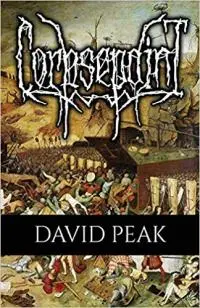 "FantasticLand: A Thriller" by Mike Bockoven (SkyHorse Publishing, Brilliance Audio)
"FantasticLand: A Thriller" by Mike Bockoven (SkyHorse Publishing, Brilliance Audio) "Providence" by Caroline Kepnes
"Providence" by Caroline Kepnes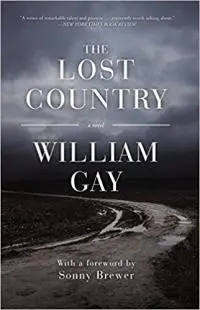 "Bearskin" by James A. McLaughlin
"Bearskin" by James A. McLaughlin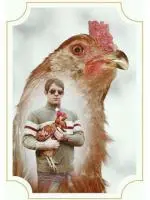 "House of Leaves: Pilot" by Mark Z. Danielewski
"House of Leaves: Pilot" by Mark Z. Danielewski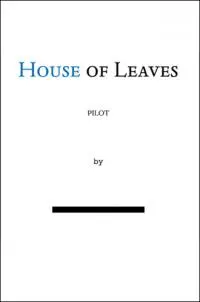 "Room to Dream" by David Lynch
"Room to Dream" by David Lynch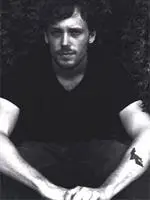 "Staying with the Trouble" by Donna Haraway
"Staying with the Trouble" by Donna Haraway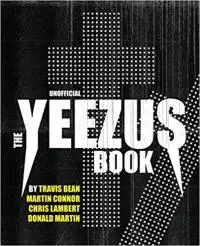 "The KLF: Chaos, Magic, and the Band who Burned a Million Pounds" by John Higgs
"The KLF: Chaos, Magic, and the Band who Burned a Million Pounds" by John Higgs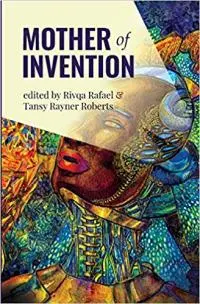 "Mother of Invention" edited by Rivqa Rafael and Tansy Rayner Roberts
"Mother of Invention" edited by Rivqa Rafael and Tansy Rayner Roberts "The Immortalists" by Chloe Benjamin
"The Immortalists" by Chloe Benjamin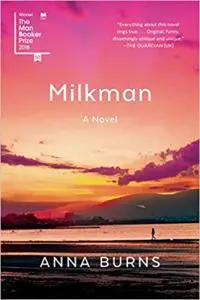 "Milkman" by Anna Burns
"Milkman" by Anna Burns







